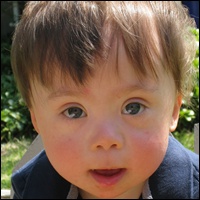
Today on Motherlode, a parenting blog on the website of the New York Times, a column appeared with the title “Outlawing Abortion Won’t Help Children with Down Syndrome.”
At the beginning of the column, we find out that the column’s author, Alison Piepmeier, is herself the mother of a four-year old daughter who has Down syndrome. Despite the fact that Piepmeier calls her daugher “a delight” and says she has been “repeatedly surprised by [her daughter’s] curiosity, her individual sense of humor and how much she has accomplished,” she still sees absolutely nothing wrong with other parents choosing to “terminate” a pregnancy if the fetus/child has Down syndrome—or, for that matter, any other reason.
It is perhaps also worthy of mention that Piepmeier is a professor of—wait for it—women’s and gender studies.
Abortion as “the Protective Choice”
After taking note of what she rightly calls the “extremely high” abortion rates for children with Down syndrome identified through prenatal screening, Piepmeier points out that some parents of children with Down syndrome are celebrating North Dakota’s recently enacted ban on abortion in cases of fetal abnormalities (including, of course, Down syndrome).
Then she begins speaking nonsense: “But outlawing abortion is not a reasonable response to this situation.”
In other words:
- Outlawing the killing of children with Down syndrome while they are still in the womb = Unreasonable.
- Permitting the killing of children with Down syndrome while they are still in the womb = Reasonable.
Got that?
Piepmeier goes on to recount some of the conversations she has had with women who “terminated their pregnancies” when they found out their baby had Down syndrome:
These were wanted pregnancies in which the fetus was already identified as a child, and often even named.
Repeatedly women told me that they ended the pregnancy not because they wanted a “perfect child” (as one woman said, “I don’t know what ‘perfect child’ even means”) but because they recognized that the world is a difficult place for people with intellectual disabilities.
Piepmeier goes on to note, chillingly:
One woman told me, “The thing is I could not, in good conscience, from the get-go, know that my child has these setbacks in life.” Another identified adulthood as the challenge: “There is no part of caring for an infant or school-aged child with Down syndrome that we didn’t think we could handle. We chose to terminate mostly on the basis of our understanding of the challenges and quality of life he and our family would face if/when he lived to be over age 21: his middle age, and end of life.” [emphasis added]
Note the “if/when” above.
Recognizing that their son or daughter might not ever live to adulthood, this couple elected to have an abortion anyway.
Piepmeier goes on:
Another woman talked quite a bit about rape. She was assaulted as a child, she knew that the statistics for sexual abuse were high for people with intellectual disabilities, and she was determined that her daughter would not experience that, so that was one of the reasons she terminated her pregnancy. She referred to her abortion several times as “the protective choice.”
Clearly, no one—especially someone who was herself a victim of child abuse—wants any child to become a victim of rape or other form of abuse.
And equally clearly, no one is in a position to be able to judge the subjective culpability of this woman—or, for that matter, of any woman—who has had an abortion.
But objectively, the act of killing a child out of a desire to “protect” that very child from harm is quite literally irrational.
Abortion a Matter “Between a Woman and Her Doctor”?
There is one group of people who are not mentioned at all in Piepmeier’s article: namely, doctors.
This is a rather curious omission, one would think, especially considering how often the talking point about abortion being a matter “between a woman and her doctor” is bandied about by the “pro-choice” movement.
From reading Piepmeier’s article, one might easily think that the women she interviewed who had abortions after discovering their children had Down syndrome came to their decisions on their own.
But most people’s instincts wouldn’t let them arrive at such rationalizations by themselves. They can only get there with the help—and implicit, if not explicit, encouragement—of a doctor.
Piepmeier goes on to write a sentence that serves exactly no purpose but to illustrate the supposed hypocrisy of pro-lifers:
If North Dakota really does want it to be “a great day for babies in North Dakota” and wants to prove that “a civil society does not discriminate against people … for their sex or for disability,” it should make the state a welcoming place for people with disabilities.
OK. So if, by every possible measure, North Dakota became the most welcoming state in the U.S. for people with disabilities, then could it go ahead and enact a ban on abortion in cases of fetal abnormalities?
![Pro-abortion protesters at League-sponsored Face the Truth Day in Chicago, 2009 [Photo by Sam Scheidler]](https://prolifeaction.org/pix/2010/mit.jpg)
Let women have abortions for whatever reason they choose, but make it a world they would like to bring a child into — even a child with an intellectual disability. [emphasis added]
And there you have it.
It took a while, but in the end, Piepmeier makes clear that even if every step possible were taken to offer help to pregnant women in need, the tired old boilerplate of “Abortion on demand and without apology!” trumps all.
